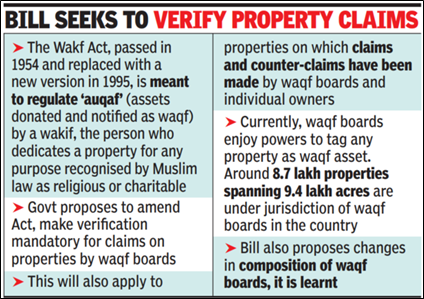PREVIOUS
Waqf board bill 2024
August 12 , 2024
105 days
336
0
- The Union government has tabled the Waqf (Amendment) Bill in the Lok Sabha.
- This legislation aims to reform the registration process for the waqf properties through a centralised portal.
- It seeks to rename the existing Waqf Act of 1995 to the Unified Waqf Management, Empowerment, Efficiency and Development Act.
- The Waqf pertains to properties that are designated exclusively for religious or charitable purposes in accordance with Islamic law.
- Once a property is established as waqf, it cannot be revoked.
- With approximately 30 waqf boards managing over 9 lakh acres of land valued at an estimated Rs 1.2 lakh crore.
- Waqf boards rank as the third-largest landowners in India, following the Railways and the Defence Ministry.
- The bill proposes the establishing of a Central Waqf Council alongside state Waqf Boards.
- Notably, these bodies will have representation from Muslim women and non-Muslims.
- It also has a provision to appoint two women to all state boards as well as to the central council.
- It designates the District Collector as the primary authority in determining whether a property is classified as waqf or government land.
- This shifts the responsibility away from the Waqf Tribunal.
- The legislation outlines the creation of a separate Board of Auqaf specifically for the Boharas and Aghakhanis, ensuring representation for Shias, Sunnis, Bohras, and Aghakhanis within waqf boards.

Leave a Reply
Your Comment is awaiting moderation.


